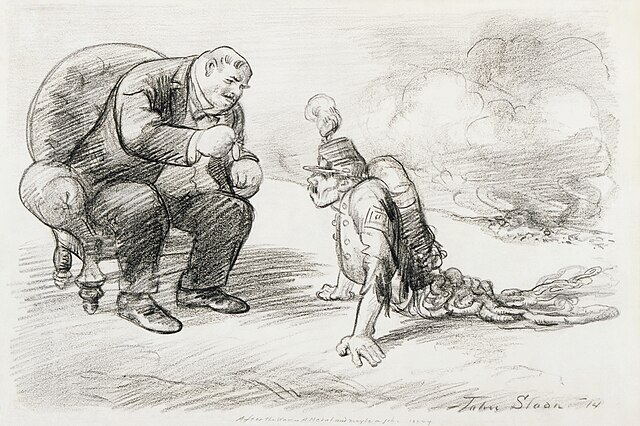
Historian Alfred McCoy joins us to discuss his new book, Cold War on Five Continents: A Global History of Empire and Espionage from Haymarket Books. "The Moment of Truth" with Jeff Dorchen follows the interview.
Help keep This Is Hell! completely listener supported and access bonus episodes by subscribing to our Patreon.
Please rate and review This Is Hell! wherever you get your podcasts. It really helps the show ascend the algorithm to reach new listeners.
The Assassination That Paved the Way for Trump’s Venezuela Attack / Séamus Malekafzali

1: We don't have to do anything: How the Democrats found their dead end. | Thomas Frank
2: No path but revolution: Introducing the Communist Manifesto. | Jodi Dean
3: Trump is the endpoint: On cruelty and isolation in American politics. | Henry Giroux
4: Replace the system, not the parts: Change beyond statues and hashtags. | Bruce Dixon
5: Down with people: How cultural elitism went mainstream. | Angela Nagle
6: Understanding the ascendant, collapsing state of modern conservatism. | Corey Robin
7: The disintegration has already begun: Austerity politics at the end of Europe. | Yanis Varoufakis
8: Conspicuous construction: A trip to McMansion Hell. | Kate Wagner
9: Reclaiming democracy and rebuilding politics at Cooperation Jackson. | Kali Akuno and Ajamu Nangwaya
10: To protect capitalism from democracy: On the right's revolutionary plan for America. | Nancy MacLean
Welcome to the Moment of Truth, the thirst that is the drink.
Well, it's happening. The days are starting to get longer. More daylight time for me to fritter away, thumbing my nose at our rapidly degrading society and its sadistic norms. Yeah, I've got a bad attitude. Cuz, friends, our society runs on pure bullshit, and everyone knows it. But that's no reason to operate a mediocre restaurant. Well, maybe it is.
Maybe our society's current completely ass-upside-down arrangement of priorities is a reason to serve mushy falafel with watery tahini. The privatization of nature, the draining of wealth from working-class communities, and the poisoning of our air, soil and water, just might justify serving harrisa seemingly flavored with a hint of Murphy's Oil Soap. I'm not a chef, I'm not a restaurant manager, I'm not even a food saboteur, so I don't know what-all goes into making such decisions.
Our nation's systemic impoverishment of its elders and its children is an international scandal, as is our substandard health care system, and our underfunded public education system, if it can even be called a system, as fragmentary and haphazard a jalopy as it is. I'd think a restaurant would take the opportunity to provide food to their patrons of an enjoyable nature, given how parsimoniously joy is being distributed these days. Is now really the best time to overcook chicken shwarma till its texture is that of cork paneling? Surely now is the least opportune moment for serving dry shwarma, which can only exacerbate a diner's sorrow rather than relieve it.
Lentils should be cooked, of course, but a bit of resistance is desirable. They aren't rolled oats, for crying out loud. A lentil salad shouldn't be slurpable, like a milkshake. And serving them thus is no way to take my mind off Donald Dump's spastic narcissism, or Ajit Pai's perverse misguidance of the FCC, or Betsy DeVos's uneducated leadership of the Department of Education. I'm not telling you how to run your business. I'm not a businessperson. I'm only expressing what countless patrons are probably thinking.
They're thinking, "This food is only making us more dissatisfied. This food is monstrous. This food is corrupt as all hell. This food is the opposite of food, the way Supreme Court Justice Neil Gorsuch is neither supreme, nor courtly, nor just."
What's with the tiny plastic bowl-shaped micro-vessel for pickle? Where did you find these, is there a store that... read more

Listen live from 9AM - 1:00PM Central on WNUR 89.3FM / stream at www.thisishell.com / subscribe to the podcast
9:15 - Philosopher Tim Crane explains what atheists miss when they view religion from the outside.
Tim is author of The Meaning of Belief: Religion from an Atheist’s Point of View from Harvard University Press.
10:05 - Historian Keri Leigh Merritt examines the labor of poor whites living outside slavery in the Antebellum South.
Keri Leigh is author of Masterless Men: Poor Whites and Slavery in the Antebellum South from Cambridge University Press.
11:05 - Historian Judith Flanders explores the populist, adaptive, multi-purpose, meaning of Christmas.
Judith is author of Christmas: A Biography from MacMillan.
12:05 - The Hopleaf's Michael Roper reviews the year in craft beer capitalism, and the year to come.
Michael is owner of Chicago's The Hopleaf Bar, in its 25th year. Try the Bitterballen.
12:45 - In a Moment of Truth, Jeff Dorchen discusses The Socialist Leisure Work Ethic and the Spirit of Falafel.
He's talked about Socialist Leisure before, but this falafel thing is definitely a new development in his ideology.
Welcome to the Moment of Truth, the thirst that is the drink.
While listening to the Nick Cave and the Bad Seeds record, Murder Ballads, I was not looking for inspirational messages. I was not expecting any. But then the song came on, "Death is not the End," and suddenly a space opened up in my brainheart, or heartbrain, for the idea of the persistence of consciousness after the death of the body, and I got to feeling interested and cheerful. Interested again in life, which had recently become disturbingly empty, and cheered by the quasi-metaphysical thinking the brainheartspace allowed.
Occam's Razor is the idea that the simplest explanation is most likely correct. Writer, musician, and sports philosopher Robert Jacobson coined the term "Bozo's Mallet" to denote asinine misuse of the simplest-explanation theory. Or, it's the doctrine that the stupidest answer is usually the correct one. In any case, either Occam's Razor or Bozo's Mallet tells us the world exists. It sure seems to. Just take a look around. Or, if you're in the dark, grope around. Feel that?
And yet the world also seems not to be there. The present moment is fleeting. Matter and energy transform. All is transient. Your eyes and ears play tricks on you. Time leaves the past behind and moves into an unknown future. Experience is subjective. And when we fall asleep, we seem to enter another world in our dreams.
But the amount of detail reported about the external world is infinite and infinitesimally specific. If it's all an illusion, it seems like overkill. I would've been satisfied with a world that didn't get anymore finely-grained than molecules. If the illusionist wanted to fool me into believing in an external reality, there was really no need to come up with quarks and, for goodness sakes, a particle-wave paradox. Really, I would've been satisfied if the world were made out of pretzel dough. Or balanced on the back of a turtle. Or an infinite stack of turtles. You could've sold me anything.
If all that detail is purely for the sake of those with a desire to continue investigating ever deeper or farther into reality – well, I'm not one of those people. I check in on those people, just to keep up with what they're thinking, but much of it is gibberish. It's definitely wasted on me. Earth, Air, Fire, and Water would've been plenty of mystery. And yet, if the illusionist went to the trouble to make an illusory universe with details for... read more

Listen live from 9AM - 1:00PM Central on WNUR 89.3FM / stream at www.thisishell.com / subscribe to the podcast
9:15 - Journalist Jess Bruder explores the low-wage labor of senior nomads working at the end of retirement.
Jess is author of Nomadland: Surviving America in the Twenty-First Century from W.W. Norton.
10:05 - Live from São Paulo, Brian Mier profiles the resistance movements working and fighting in post-coup Brazil.
Brian's book of interviews, Voices From the Brazilian Left, is available to order now from Brasil Wire.
10:35 - Anthropologist Aaron Neiman connects worker pain to the pre-existing conditions of labor under capitalism.
Aaron wrote the essay A Pain in the Back for The New Inquiry.
11:05 - Writer Sara Wachter-Boettcher finds social inequality coded deep within the devices of Silicon Valley.
Sara is author of Technically Wrong: Sexist Apps, Biased Algorithms, and Other Threats of Toxic Tech fom W.W. Norton.
12:05 - Historian Robin D.G. Kelley finds the future of Black radicalism laid out in the paths of ancestors.
Robin wrote the essay "Winston Whiteside and the Politics of the Possible" for the Verso collection Futures of Black Radicalism.
12:45 - In a Moment of Truth, Jeff Dorchen's imagination is sparked by a Nick Cave song.
Jeff keeping it light for the holidays.
Welcome to the Moment of Truth: the thirst that is the drink.
I want to correct the common misconception that we don't have seasons here in LA. False. We have rain season, fire season, allergy season, and pilot season.
We also have many different kinds of milk. Goat milk, camel milk, almond milk, hemp milk, buttermilk, buffalo milk, cashew milk, turmeric milk, 2% milk, lactose-free milk... an exhaustive list would be exhausting.
I like lists. I like labels. I love to hate-read commercial copy. I've been an avid reader of cereal boxes since I was a wee lad. The cereal box is a rare example these days of literature that is far more commonly read on hard copy than in digital format.
Food labels are deceptively misinformative. They tell you the selective nutritional content of the grub in the container. They give a somewhat fanciful list of ingredients. (I collect synonyms for "sugar.") Labels can even more fancifully describe the essential nature of the food: is it "all natural?" Is it "organic?" You never see food announcing that it's "partially synthetic," "now less delicious," "sprinkled with insect parts," or "made from repurposed latex detritus and shaved lead." We don't look for truths on our food packaging.
Where do we find truths in hard copy? Books! Ever read one of these rustic bastards? They're made of paper and other old-fashioned materials, such as string and glue, cloth, and sometimes leather.
Some books contain hard truths, some easy ones, and some no truths at all, but only lies. Cowboys and seafaring people used to read them, that's how ancient books are.
I'm reading one currently! There are a couple of tricks to it. First, you have to find a comfortable position in which to hold the equipment and gaze at it for minutes at a time. Secondly, you have to open the thing, and hold it open, either on a lectern, or using your human hands, feet, face, or a heavy object such as a brick or a rock. Even another book will do. Even a cereal bowl. The paper and ink inside reveal the thoughts of the person or persons who composed or compiled the contents. It sounds a lot more complicated than it is, and that's one of the few things you can say that about.
Books are also unusual in that they begin in one place and end in another, unlike a Mobius strip, or the universe. In this way books mimic journeys. And, like a journey, they can be bad for your health. You can lose things on the way. Books can cause brain... read more

Chuck picks his 10 favorite books from the 100+ he read for the show this year:
Flâneuse: Women Walk the City in Paris, New York, Tokyo, Venice and London
Locking Up Our Own: Crime and Punishment in Black America
Tear Gas: From the Battlefields of WWI to the Streets of Today.
Notes on a Foreign Country: An American Abroad in a Post-American World
Chained in Silence: Black Women and Convict Labor in the New South
Down Girl: The Logic of Misogyny
Kill All Normies: The online culture wars from Tumblr and 4chan to the alt-right and Trump
Angela Nagle
Interview



